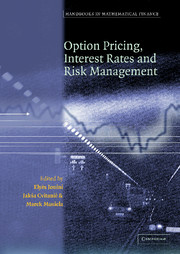Introduction
Published online by Cambridge University Press: 29 January 2010
Summary
This book, the final in a series of stand-alone works, is a collection of invited papers that represent the current state of research in the field of Mathematical Finance, as seen by leading researchers in the field. Some of the contributed articles survey the existing results for a given topic, some discuss and present new research, some point out open problems and future directions, while many do all of the above. While effort was made to cover most of the important topics in the field, the book is not meant to be encyclopedic in nature. The outcome was ultimately influenced by the present scientific interest of the contributors and the editors. The primary audience are researchers in academia and industry who already have some basic knowledge of the field. This book might serve as a quick introduction to a specific topic, leading to recent results and open problems. It can also serve as valuable reference material.
The first Part focuses on the theory and practice of pricing derivative securities. The paper “Arbitrage theory” by Y. Kabanov considers models where an investor, acting on a financial market with random price movements and having a given time horizon, subsequently transforms his initial endowment into a certain terminal wealth. In this framework, the author answers the following question: whether the investor has arbitrage opportunities, i.e. non-risky profits. The article examines and gives an answer to this question in different frameworks: one-step and multi-step models with finite space of possible states of the world, discrete-time models with infinite space of possible states of the world, continuous time models, semimartingale models, large financial markets and models with transaction costs.
Information
- Type
- Chapter
- Information
- Handbooks in Mathematical FinanceOption Pricing, Interest Rates and Risk Management, pp. ix - xviPublisher: Cambridge University PressPrint publication year: 2001
